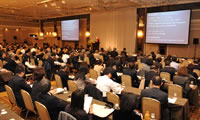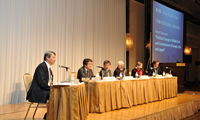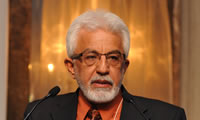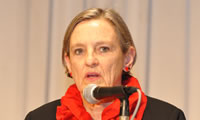Political Change in the Middle East:
Civil-military Relations, Democratization, and International Commitment
January 31, 2012, (Tuesday)
B2F, Room "Daigo", Sheraton Miyako Hotel Tokyo
>>Event Guide/Program
Organizers: IDE-JETRO, The World Bank, The Asahi Shimbun Company
Keynote Address1 | Keynote Address2 | Panel Discussion(1) | Panel Discussion(2)


会場の様子
Panel Discussion(2)
Ali Ferdowsi (Professor and Chair, Department of History and Political Science,
Notre Dame de Namur University)
Various similarities can be pointed out between the latest Arab revolution and the Islamic revolution that took place in Iran in 1979. It seems fair to say that Islam was the cause of these revolutions and the final outcome. Meanwhile, I have heard from people in Arab countries that they do not want to become the next Iran or become like Iran. Western countries do not believe that the governments that have been formed as a result of the Arab Spring will be similar to Iran’s government. They recognize that the latest revolution is historically and culturally different from the revolution that occurred in Iran. On the other hand, we have seen some conservative news media and related sources in the United States raise alarm about the United States’ diminishing influence over Islamic rule in the region.
The popular uprising that began in Iran on June 12, 2009 shared similarities with the latest popular uprisings in Arab countries. The uprisings were led by young people and made active use of social media. The popular uprising in Iran in 2009 did not seek new rights, but were intended to preserve the rights and freedoms that were thought to be secured by the Islamic Revolution. Ironically, however, this popular uprising served to close a chapter on the Islamic Revolution of 1979.

Ali Ferdowsi
(Professor and Chair,
Department of History and Political Science,
Notre Dame de Namur University)
Lisa Anderson (President, The American University in Cairo)
The U.S. currently cannot afford to pay close attention to the Middle East due to domestic issues and the European currency crisis. On the other hand, the governments of Middle Eastern countries have found it increasingly difficult to formulate diplomatic policy because of uncertainty regarding the U.S. government’s approach to the region.
Next, Libya is now trying to build a new state from the ashes of a country where no stable government has existed over the past century. Because Islam is the only source of national unity in Libya, I believe that the country’s only option is to build an Islamic state based on Islam. Arab countries are now at a turning point for nation building. In this context, I believe that there are several countries in which Islamic leaders for the most part will play a central role in the nation building.
Let me also make one point regarding the military. The military’s standing and role differ significantly in each country because these factors reflect each country’s history and culture. For this reason, we saw a diverse array of military responses to the popular uprisings. Therefore, in order to understand these military responses, one must not only examine the factors within the military establishment, but also give enough consideration to factors such as national origins, political regimes and social structure.

Lisa Anderson
(President, The American University in Cairo)
Cyril Muller (Vice President for External Affairs, The World Bank)
I advocate the “Indonesian model” as a template for the MENA region’s economic development following the recent political upheaval. Indonesia is a country in which Islamic political forces and the military skillfully found a good balance in the course of transitioning to a democratic state. Therefore I am optimistic about the prospects for various Arab countries to achieve a similar transition.
Next, I would propose giving thought to how to achieve “a high quality of economic growth.” One crucial factor for stimulating economic growth is the existence of a highly educated segment of young people. However, the real issue is whether a country can effectively utilize these human resources. In the labor markets of various Middle Eastern countries, there have not been enough employment opportunities for highly educated young people. The main reasons are issues such as corruption, tradition, and bloated government bureaucracy. However, the entrepreneurial spirit that comes naturally to young people must be emphasized. Unless various MENA countries can effectively create attractive workplaces in their countries, these human resources will only seek employment abroad.
Above all, the MENA region currently needs investment. In the Asian region, abundant investment has played a crucial role in the region’s development. In this sense, I believe that Middle Eastern countries should refer to the experience of Asia going forward. Moreover, under new political regimes, it will be crucially important to ensure the transparency of society as a whole.

Cyril Muller
(Vice President for External Affairs,
The World Bank)
Keynote Address1 | Keynote Address2 | Panel Discussion(1) | Panel Discussion(2)

